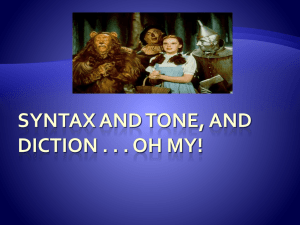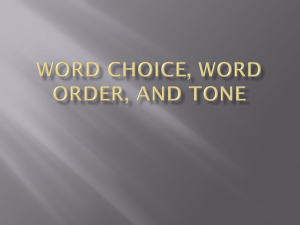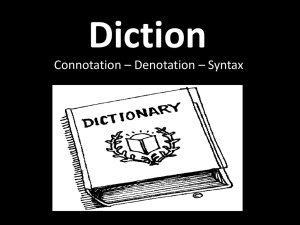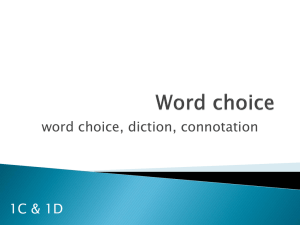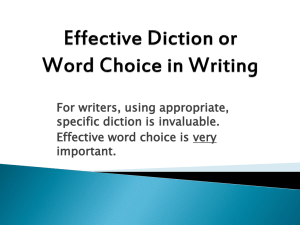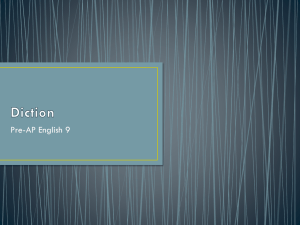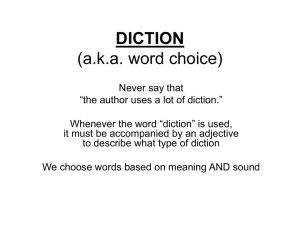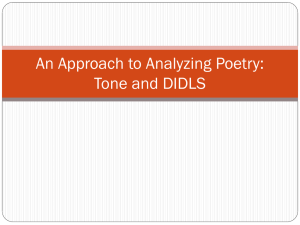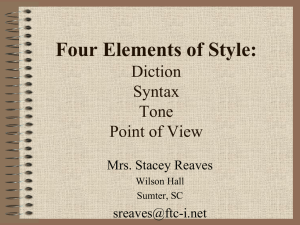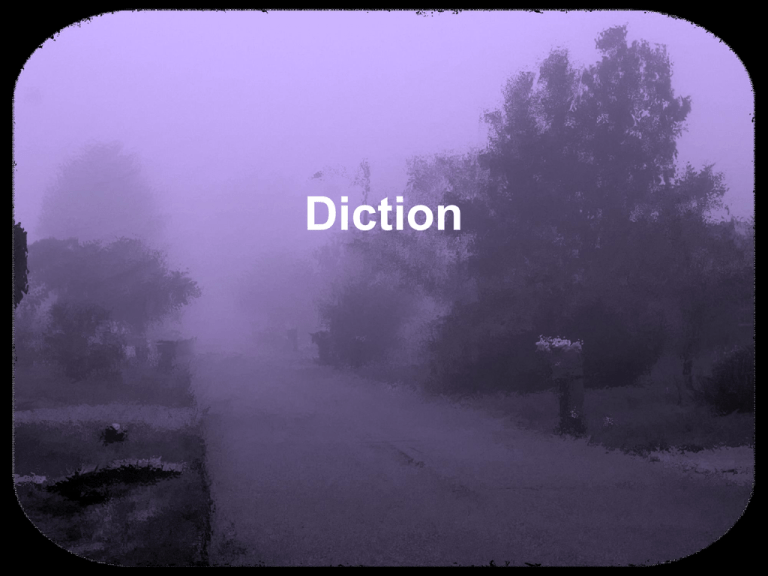
Diction
Diction: an author's word choice
All authors choose particular
words to create an effect.
2
3 Levels of Diction
*Elevated or Formal
*Neutral
*Low or Informal
3
Elevated Diction (Formal Diction)
highly formal language (most people would say it sounds “smart”),
*polysyllabic words (words with multiple syllables)
*no contractions
*no slang
* serious tone
*effect: creates separation between writer and audience
Example from Nathaniel Hawthorne’s Scarlet Letter:
“Discerning the impracticable state of the poor culprit’s mind, the elder
clergyman, who had carefully prepared himself for the occasion,
addressed to the multitude a discourse on sin, in all its branches, but
with continual reference to the ignominious letter.”
4
Neutral Diction
uses standard language and vocabulary without elaborate words
*monosyllabic words (words with 1 syllable)
*popular vocabulary (what most people would say)
*casual tone
*may use contractions
Example from Ernest Hemingway’s Old Man and the Sea:
The shark swung over and the old man saw his eye was not
alive and then he swung over once again, wrapping himself in
two loops of the rope. The old man knew that he was dead but
the shark would not accept it.
5
Low or Informal Diction
is the language of everyday use! It is relaxed and
conversational.
* monosyllabic words
* casual tone
*slang
* contractions
*effect: creates a sense of familiarity between writer and
audience
Example from Toni Morrison’s The Bluest Eye:
Three quarts of milk. That’s what was in that icebox yesterday.
Three whole quarts. Now they ain’t none. Not a drop. I don’t
mind folks coming in and getting what they want, but three
quarts of milk!
6
Concrete vs Abstract Diction
Concrete diction- specific words that describe physical
qualities or conditions (you could see/touch it).
Example from Toni Morrison:
“The tears came fast, and she held her face in her
hands. When something soft and furry moved
around her ankles, she jumped and saw it was a
cat.”
Abstract diction- language that represents ideas, emotions,
conditions, or concepts.
Example from Joseph Conrad, who uses the words,
“Incredible, inscrutable, inconceivable, and
unfathomable.”
7
Connotation and Denotation
Denotation- the literal meaning of a word (dictionary
definition of a word)
Example: the denotation of home is a place where
one lives
Connotation- the emotions attached to a word
Example: the connotation of home is positive and
warm; it’s a place where one belongs
(Words will have either a POSITIVE or a
NEGATIVE connotation)
8
Euphony vs Cacophony
Euphony: words that sound pleasant together
* achieved through the use of vowel sounds
example: “The mild-eyed melancholy Lotos-eaters
came.”-Lord Tennyson
Cacophony: words that jar against one another
* produced by combinations of words that require a
staccato, explosive delivery (like k, t, p).
example: “With throats unslaked, with black lips
baked” –Coleridge
(c) 2007 brainybetty.com ALL
RIGHTS RESERVED.
9
Method for discerning diction:
1. Is the diction elevated, neutral, or informal?
2. Is the diction concrete or abstract?
3. What is the denotation of the word?
4. What is the connotation of the word?
5. Is the diction euphonic or cacophonic?
10
Practice
“Peep the style and the way the cops sweat us
The number one question is can the Feds get us
I got vendettas in dice games against ass betters
and niggaz who pump wheels and drive Jettas”
-Jay Z “Brooklyn’s Finest”
1.
2.
3.
4.
5.
Is the diction elevated, neutral, or informal?
Is the diction concrete or abstract?
What is the denotation of the word?
What is the connotation of the word?
Is the diction euphonic or cacophonic?
11
"What's in a name? That which we call a rose
By any other name would smell as sweet.”
-William Shakespeare, Romeo and Juliet
1. Is the diction elevated, neutral, or informal?
2. Is the diction concrete or abstract?
3. What is the denotation of the word?
4. What is the connotation of the word?
5. Is the diction euphonic or cacophonic?
(c) 2007 brainybetty.com ALL
RIGHTS RESERVED.
12
“I want your ugly
I want your disease
I want your everything
As long as it’s free
I want your love
Love-love-love
I want your love”
-Lady GaGa, “Bad Romance”
1. Is the diction elevated, neutral, or informal?
2. Is the diction concrete or abstract?
3. What is the denotation of the word?
4. What is the connotation of the word?
5. Is the diction euphonic or cacophonic?
(c) 2007 brainybetty.com ALL
RIGHTS RESERVED.
13
“I see no changes, all I see is racist faces
Misplaced hate makes disgrace to races
We under I wonder what it takes to make this
One better place, let's erase the wasted
Take the evil out the people they'll be acting right
'cause both black and white is smokin' crack tonight
And only time we chill is when we kill each other
It takes skill to be real, time to heal each other”
-Tupac Shakur, “Changes”
1. Is the diction elevated, neutral, or informal?
2. Is the diction concrete or abstract?
3. What is the denotation of the word?
4. What is the connotation of the word?
5. Is the diction euphonic or cacophonic?
(c) 2007 brainybetty.com ALL
RIGHTS RESERVED.
14
“Get stewed. Books are a load of crap.”
–Philip Larkin, “A Study of Reading Habits”
1. Is the diction elevated, neutral, or informal?
2. Is the diction concrete or abstract?
3. What is the denotation of the word?
4. What is the connotation of the word?
5. Is the diction euphonic or cacophonic?
(c) 2007 brainybetty.com ALL
RIGHTS RESERVED.
15
“A man that is born falls into a dream like a man who falls
into the sea. If he tries to climb out into the air as
inexperienced people endeavor to do, he drowns.”
-Joseph Conrad
1. Is the diction elevated, neutral, or informal?
2. Is the diction concrete or abstract?
3. What is the denotation of the word?
4. What is the connotation of the word?
5. Is the diction euphonic or cacophonic?
(c) 2007 brainybetty.com ALL
RIGHTS RESERVED.
16
“You know it has all been planned
The quartet of deliverance rides
A sinner once a sinner twice
No need for confession now
Cause now you have got the fight of your life”
-Metallica, “The Four Horsemen”
1. Is the diction elevated, neutral, or informal?
2. Is the diction concrete or abstract?
3. What is the denotation of the word?
4. What is the connotation of the word?
5. Is the diction euphonic or cacophonic?
(c) 2007 brainybetty.com ALL
RIGHTS RESERVED.
17
“The devil opened up his case and he said: "I'll start this show."
And fire flew from his fingertips as he resined up his bow.
And he pulled the bow across his strings and it made an evil hiss.
Then a band of demons joined in and it sounded something like this.”
-Charlie Daniels, “The Devil Went Down to Georgia”
1. Is the diction elevated, neutral, or informal?
2. Is the diction concrete or abstract?
3. What is the denotation of the word?
4. What is the connotation of the word?
5. Is the diction euphonic or cacophonic?
(c) 2007 brainybetty.com ALL
RIGHTS RESERVED.
18
Homework
Step 1: Download the lyrics to your favorite song
Step 2: Underline the words of the song you find important
in terms of the writer’s choice of diction
Step 3: Analyze the author’s use of diction (questions #1-5)
and explain WHY you think the author made these choices
in diction.
(c) 2007 brainybetty.com ALL
RIGHTS RESERVED.
19

